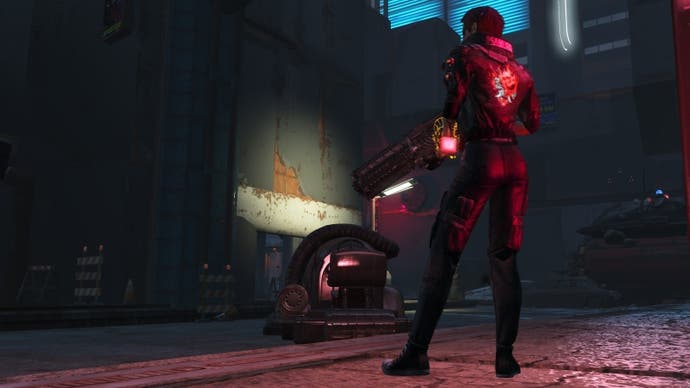Cyberpunk 2077 got delayed, so I made it in Fallout 4 instead
Postmodding literature.
By early January, I'd noticed something strange was happening to me. Grimes, La Roux and synthwave groups like Magic Sword had entered my music playlists. I'd finally watched Blade Runner for the first time, and was scrolling through galleries of the late Syd Mead's brilliant cityscapes. I'd even bought Neuromancer and added it to my pile of books I will definitely get around to reading.
It was all in anticipation of one game originally due to arrive in April: CD Projekt Red's Cyberpunk 2077. Yet as we all know, that release date is no longer happening, and Cyberpunk 2077 has been shunted back to September. So what was I to do with all that leftover cyberpunk energy?
I could have continued my media binge, but that's hard to maintain for eight months - and I was eager for some gameplay. As my editor later mentioned, I could have just bought Deus Ex. Yet something far more radical had already entered my mind.
What if I recreated Cyberpunk 2077... with mods in Fallout 4?
If you're looking to mod Cyberpunk into any game, Fallout 4 is a good pick: many of its assets already have a run-down techy feel, albeit perpetually stuck in the '50s rather than the '80s. Unsurprisingly there's already a number of Cyberpunk 2077-themed mods available - but I wanted to see just how far I could push Fallout 4 to resemble the experience shown in the Cyberpunk 2077 gameplay demo videos, which meant looking at mechanics and even small details like the HUD.
I resolved to keep modding until I broke either the game, the computer, or myself. Two weeks later, I've managed to produce something resembling a cyberpunk experience within Fallout 4 - although the process was somewhat messy.
Things very nearly failed at the first hurdle. Dystopian, neon-drenched cities have formed the backbone of nearly every cyberpunk narrative (perhaps too often) and I simply wouldn't be able to start my project without one. Unfortunately this was also the most protracted part of the process. Most Fallout 4 location mods require a large set of additional mods to work, and my first pick - a massive Blade Runner tribute overhaul for Hangman's Alley - had a required mod list so vast (with many now removed) that I couldn't get it working. Instead, I went for something a little smaller called Blade Runner Avenue. Look, there were no Cyberpunk 2077 cities, so just ignore the Tyrel sign.
It was still a headache, requiring about 22 plugins, a script extender and the Transfer Settlements mod to import it - and even then the mod's in-game blueprint threw up several more mods required to provide assets. Yet eventually I found myself standing in a bog as a city assembled itself before my very eyes. It's not a massive space, but the mod does a great job of recreating a grim corporate feel with towering skyscrapers and shopfronts, along with a claustrophobic market space and a detective-style apartment. To make it all moodier, I used Darker Nights to plunge mini Night City into permanent gloom.
Alas, the struggle wasn't yet over: various plants and debris were clipping through from the marshland below, and this was really throwing off the vibe. I went around weed-picking most through console commands and a mod called Scrap Everything - but the trees became the bane of my existence, defying my every attempt to uproot them. According to the internet, many of Fallout 4's trees are essentially baked into the game world (via precombines) and are thus incredibly difficult to remove. Dead trees: welcome to cyberpunk.
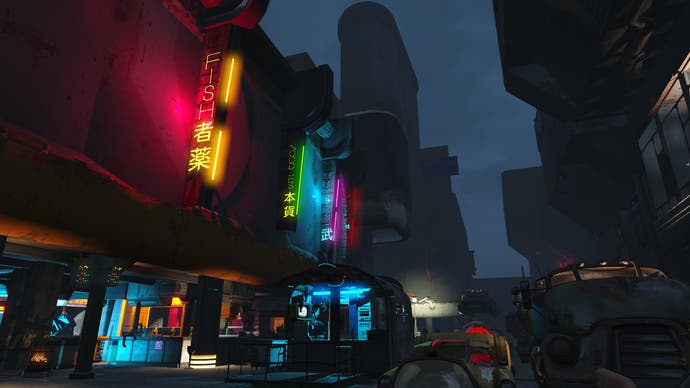
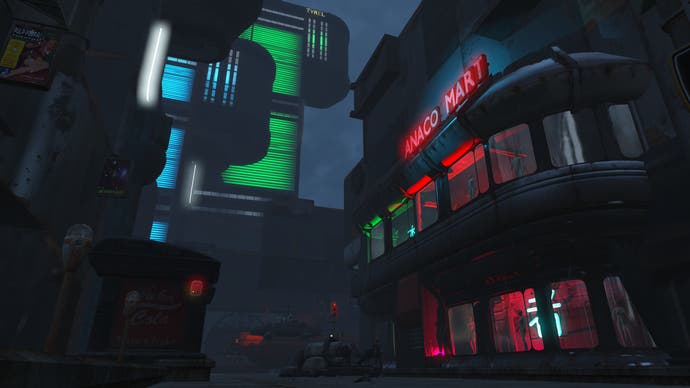
City complete, it was time for character customisation. Aside from an unfortunate incident where my character lost her eyes, this was pretty smooth sailing. I wanted the player-character to resemble female V, and I tried my best with the Fallout 4 character creator to produce something that didn't look like an irradiated potato. With the help of mods I recreated the golden glowing eyes shown in the first Cyberpunk 2077 demo, along with surface wiring and an edgier hairdo. Then it was a matter of slapping on as much black eyeliner as I wore in my early teens.
The most Cyberpunk 2077 thing in this entire mod collection, of course, is the fabulous CROSS_77 Samurai jacket, which comes with gloves, an outfit and a demonic holographic headpiece (which I removed to prevent it hiding the face I made). Coupled with a holographic pipboy complete with cyber sounds, the look was good to go. Or almost, as I still had to find some weapons to make V armed and dangerous.
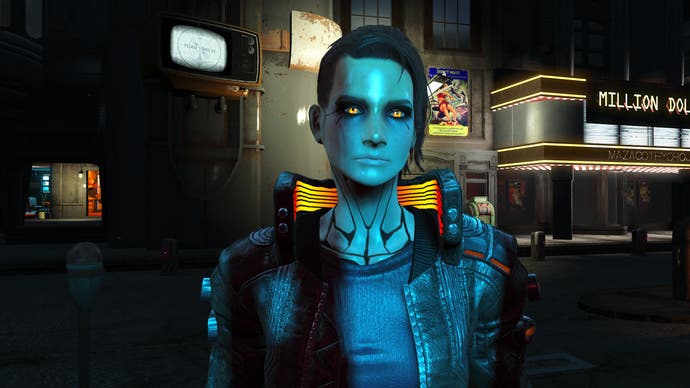
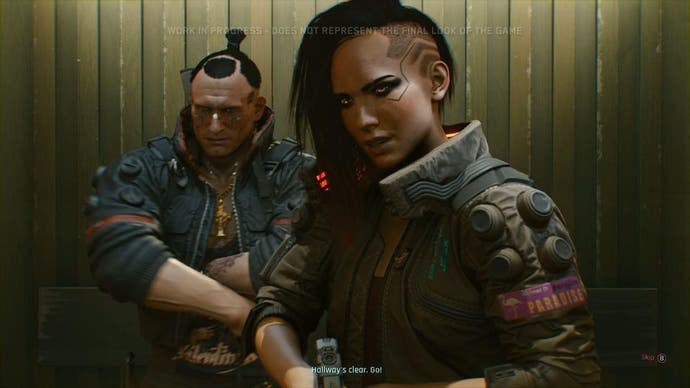
Based on the weapons shown in Cyberpunk 2077's 2018 gameplay demo, an easy pick was the Gun GS Cyberpunk pistol, which is similar to the Militech weapon V uses and can be modded to have automatic fire and a glow sight. I wanted to give her a full arsenal, so I installed a Vector and modded it with a suppressor, along with a Cryolance weapon that resembled the shotgun. I'm not sure energy weapons are particularly cyberpunk, but it looks convincing when given three barrels.
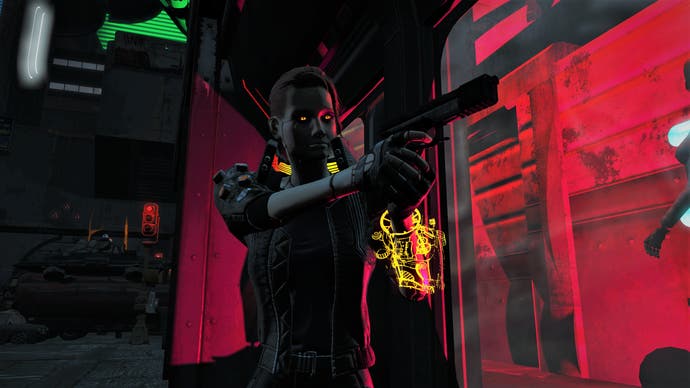

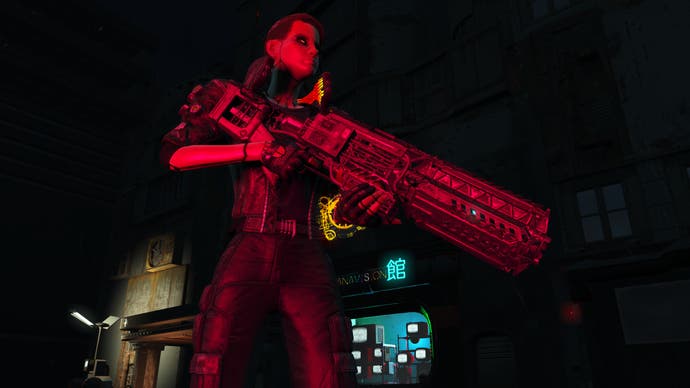
It's all very well looking the part, but I wanted to see what V could actually do. This is where I had to get really creative. One of the abilities shown in the demos is that V can scan enemies with her eyes to outline them, so I found a mod that highlights enemies at the touch of a button. Self-Guided Sniper Bullets let me install targeting computers on some guns, which aside from being ridiculously overpowered, also resembled the smart gun from the 2018 demo - even if the bullets didn't have the same satisfying curved trajectory. I did attempt to make the bullets a little flashier with a tracer mod.
Cyberpunk wouldn't be cyberpunk without the ability to hack things, and thankfully Fallout 4 already has something close to that with the Robotics Expert perk. In the vanilla game, you have to sneak up on a robot to hack it - but jlauzon's Robotics Expert Overhaul lets you do this remotely mid-combat, and also hack turrets.
By far the most satisfying ability I added, however, was Bullet Time - which allowed me to produce those awesome slow-motion moments akin to Cyberpunk 2077's Kereznikov ability (usable after taking a reflex booster drug). Fallout 4 does have something similar in the form of Jet, but that drug slows down everything and can't be toggled on and off. In light of this I felt Bullet Time - which drains AP but can be used in shorter bursts - was a better fit. Conveniently, the ability also allowed me to change direction mid-air, and concentrate my fire on enemies' legs - two features also shown in the 2018 demo.
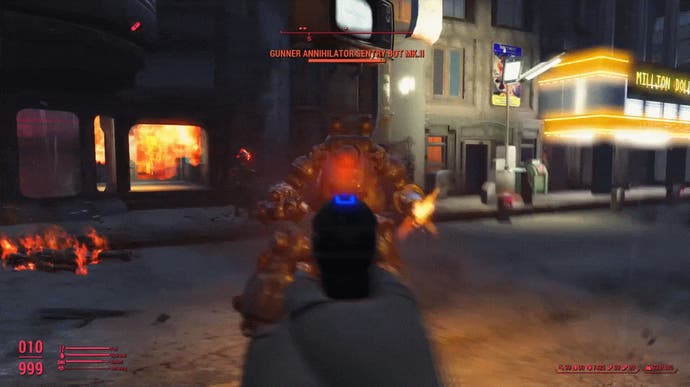
Yet I particularly wanted a post-human element where abilities were tied to body implants, and two mods fit the bill well: CROSS Pre-War Cybernetics and Cybernetic Implantation Laboratory. The former has more of a focus on building exoskeletons, but allowed me to craft something similar to the strengthened arms in the 2019 demo (I opted to add electrocution for the video because, well, it looked cool).
The implants mod, meanwhile, is more typically cyberpunk as the technology is integrated into the player's body. It also allows you to construct your own implants lab, which introduces some elements of realism by making you conduct research and wait in-between operations. More importantly, it's got a fantastic implant called the Subcutaneous Micro-Relay, effectively a short-distance teleport. This was pretty much the closest I could get to V's enhanced movement which allows her to jump forwards in a flash. Although, being honest, I did abuse this new-found power as a method to get down from the flat. There were no stairs.
After an unsuccessful scout for mantis blades and a Johnny Silverhand companion, I moved on to the finer details. I recreated the slanted HUD with a Cyberpunk 2077 UI preset mod, changing the colour to pink-red and adding a bunch of widgets. Sure, it isn't strictly like Cyberpunk 2077's HUD - but a cluttered interface is definitely in the cyberpunk spirit. Next up was floating damage, which I tweaked to somewhat resemble the combat text in Cyberpunk 2077, even if it lingers a little long in the air. To put the cherry on top, I also installed a custom radio mod and popped in some intense synthwave music to play while I was fighting.

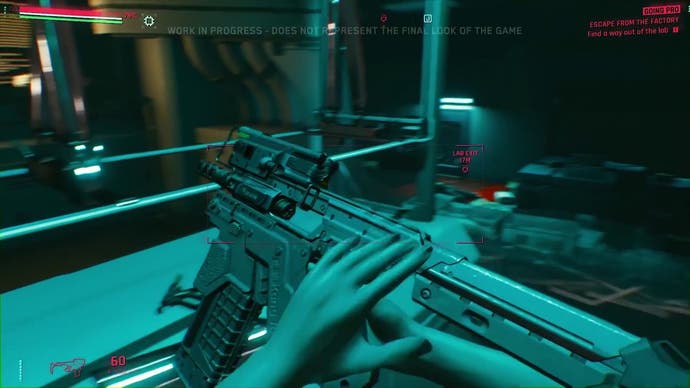
Finally, I was ready to start work on a combat demo to display all these features. If only I knew what was to come.
Getting Fallout 4's NPCs to behave is an absolute nightmare. After initially using re-textured synths as enemies - which fell apart easily or turned invisible if I used a Courser - I settled on the Rust Devils faction, a mixture of robots and humans. To demonstrate the hacking ability, I needed to place a turret, but it took an age to prevent it from immediately mowing down the other enemies (a problem eventually solved with console commands). The turret also mysteriously caused some enemies to run away - something you can still see in the combat demo if you keep a close eye on the first robot. Hacking the turret to override it, meanwhile, was too powerful to show in the demo as it simply flattened everyone.
The combat demo also had a performative element, and I had to get to grips with the new mechanics, time myself with the music, and make the whole thing look relatively natural. I also cannot tell you how many times I broke my legs when teleporting downstairs.
To make matters more complicated, by this point I'd installed so many mods that some of them had finally started breaking. I was able to hold the creaking build together by reshuffling the load order and reinstalling some mods, and somehow, I ended up with a finished combat demo. But that was only half the battle, as I also wanted to create a peaceful city population - and they weren't exactly compliant.
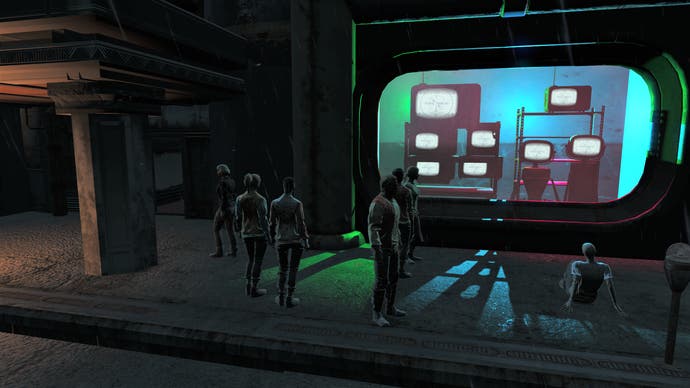
It turns out that simply spawning in settlers doesn't exactly work, and after installing Better Settlers, I found myself with a modern but completely stationary population. Not good, not bustling. I discovered I had to invite each individual to the settlement to get them to move - and only through giving settlers specific animations and freezing them at their workstations was I able to create an even halfway-convincing city. This did not stop them doing stupid things such as walking into walls, falling under the settlement, or mysteriously teleporting upstairs to sleep in the apartment bed. Despite my best efforts to disable the AI with console commands, they'd often still bonk me on the head when I pickpocketed their ugly leather armour. And, though I'd artificially increased the number of settlers to reach a population of 47, there came a point where this started to make the game unstable.
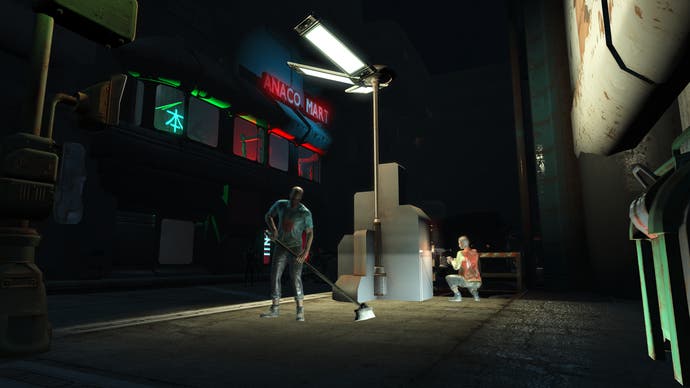
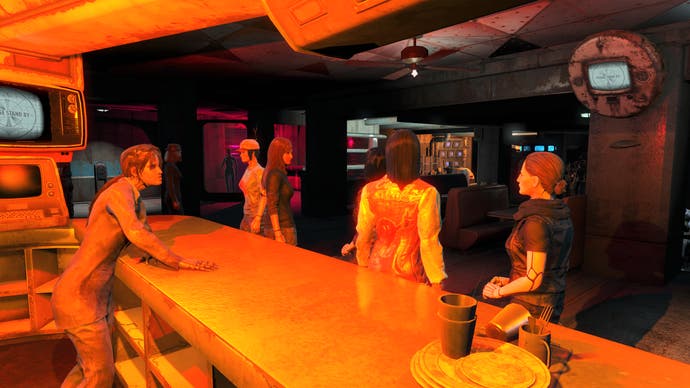
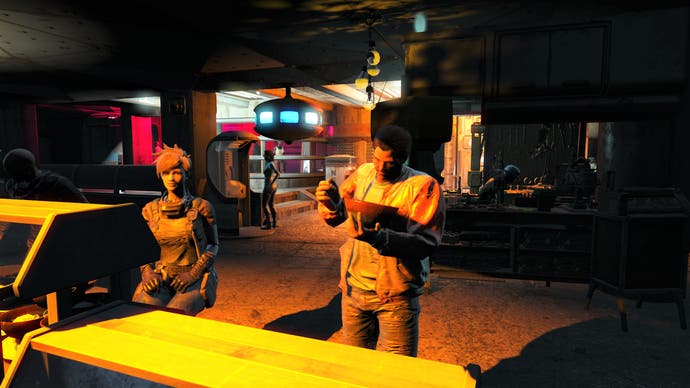
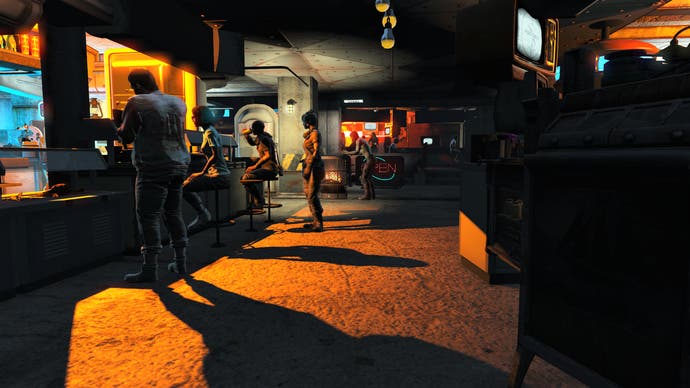
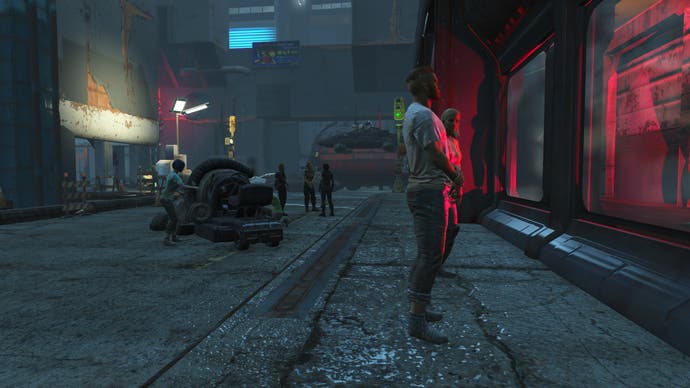
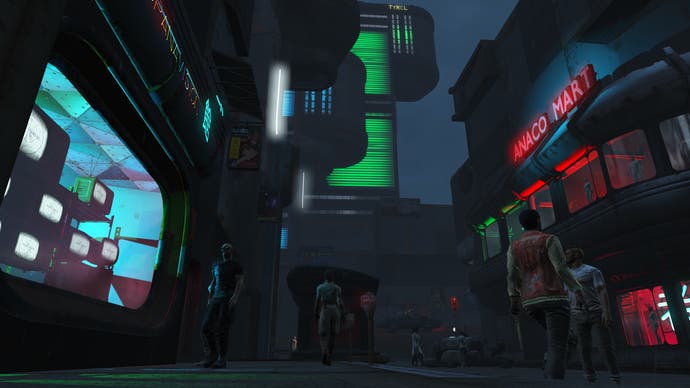
Frankly, it was a minor miracle that all the mods worked together, with only a few crashes and one alarming incident where I couldn't stop the camera spinning after an INI file edit. By the time I was finished, I'd tried out over 100 mods - many of which didn't make the final cut due to technical issues. I'd also spent hours problem-solving my way around Fallout 4's strange rules. Here's an example: rather than simply giving myself the Robotics Expert perk, I had to instead add perk points then manually select it in the perks menu so it would actually work.
While it may have somewhat looked the part (and the new mechanics were immensely satisfying), there were limits to what I could do. Apart from the cursed AI, I was also missing a narrative, interactivity and Cyberpunk's RPG elements - thus making the whole thing flashy but rather shallow. I'd like to think the actual Cyberpunk 2077 will go beyond fetishising retrofuturism into exploring deeper themes - although that's a criticism frequently levelled at cyberpunk works.
In many ways, I think the process of creating the project was possibly more cyberpunk than the end result. As worded by Dani Cavallaro, cyberpunk integrates "hyperefficient structures of high technology with the anarchy of street subcultures". While the modding community isn't exactly a street gang, I think it can absolutely be defined as a subculture - one that exists largely online, publicly distributes and collaborates on work, and retools high-tech commercial products to suit its own needs (often beyond the original creator's intentions). So mod creators are pretty cyberpunk in my book - as was my own quest to transform Fallout into Cyberpunk and push it to the absolute limit. My struggle to control Fallout 4's rebellious AI and prevent them performing human actions also felt ominously appropriate. Maybe, having placed them in such a dystopian and hopeless world, I was the bad guy?
